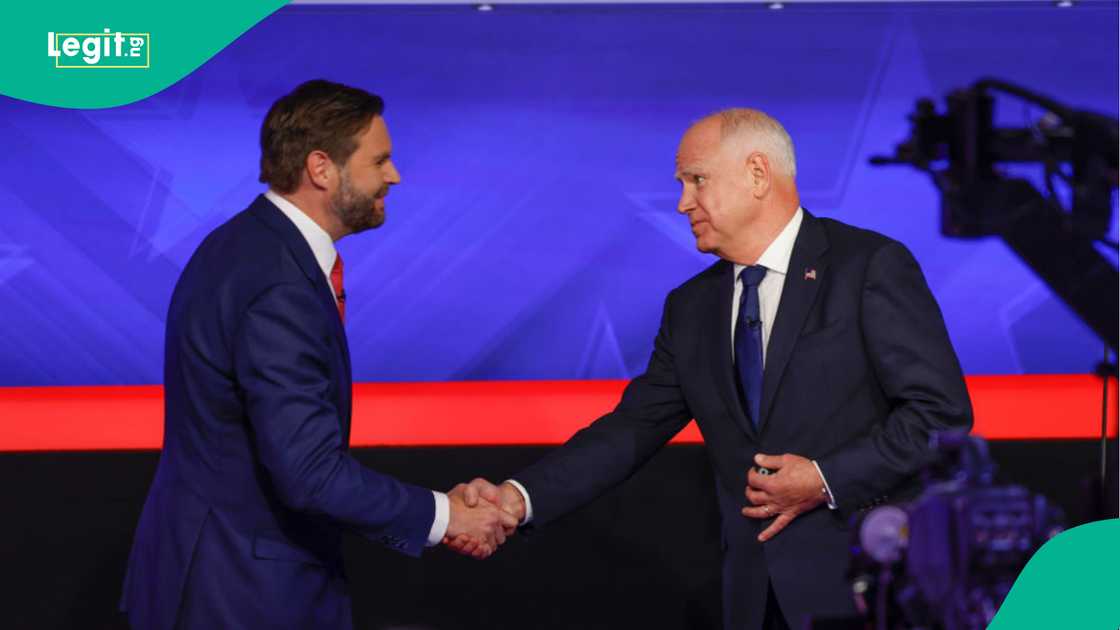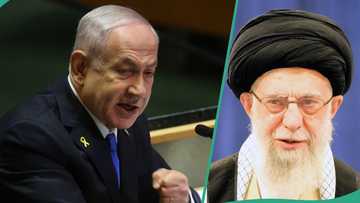5 Takeaways: Israel, Iran, Middle East Tensions Dominate Vance-Walz US Debate
- In a debate marked by international tensions and domestic policy clashes, Minnesota Governor Tim Walz and Ohio Senator JD Vance faced off in a crucial vice presidential debate
- The event, hosted by CBS News, tackled pressing issues from the Middle East crisis to gun violence and abo'rtion rights
- With just five weeks until election day, the debate offered a glimpse into the candidates' strategies and the key issues shaping the final stretch of the campaign
In a high-stakes showdown, Minnesota Governor Tim Walz and Ohio Senator JD Vance faced off in a vice presidential debate that was as much about their policies as it was about their personalities.
The debate, hosted by CBS News in New York, took place against the backdrop of escalating tensions in the Middle East, with Iran launching ballistic missiles in response to Israel’s attacks in Lebanon and Gaza.

Source: Getty Images
With just five weeks until election day, the debate was a crucial moment for both candidates to make their case to the American public. Here are five key takeaways from Tuesday’s debate.
1. Israel issue opens the debate
The debate began with a focus on the Middle East crisis. Moderator Margaret Brennan asked both candidates whether they would support Israel if it decided to strike Iran in retaliation for the missile attacks. This question set the tone for a debate heavily influenced by international events, highlighting the candidates’ foreign policy stances.
2. Rhetoric on immigration
Immigration was a hot topic, especially following President Trump’s controversial remarks about Haitian migrants in Springfield, Ohio. During the debate, Vance took a more measured approach, distancing himself from Trump’s unsubstantiated claims that Haitian migrants were abducting and eating neighborhood pets. This shift in tone was notable as Vance aimed to appeal to a broader electorate.

Read also
Just In: Anxiety as Israel threatens to retaliate fierce missiles fired by Iran, details emerge
3. Scrutinizing fact-checking
The issue of fact-checking was a significant point of contention. CBS News decided not to fact-check live during the debate, instead offering viewers a QR code for post-debate analysis. This decision came after backlash from the Trump campaign, which opposed live fact-checking during the presidential debates.
The move underscored the ongoing tension between media outlets and the Republican campaign regarding the handling of misinformation.
4. Candidates Tackle Lowering Gun Violence
Gun violence was another critical issue, especially in the wake of a tragic school shooting in Georgia. Both Walz and Vance were pressed on their plans to address gun violence.
The debate highlighted their differing approaches, with Walz advocating for stricter gun control measures and Vance emphasizing the need for mental health support and community-based interventions.
5. Advantage on Abo'rtion
Abo'rtion access emerged as a flashpoint during the debate. Walz highlighted the impact of the Supreme Court’s decision to overturn Roe v. Wade, emphasizing that it left the legality of abor'tion up to individual states.
He argued that this decision underscored the importance of electing leaders who would protect reproductive rights, a key issue for many voters in the upcoming election.
Trump, Harris debate
Meanwhile, Legit.ng earlier reported that Vice President Kamala Harris and former President Donald Trump faced off for the first time on Tuesday night.
Hosted by ABC News at the National Constitution Center in Philadelphia, the 90-minute exchange was a fiery showdown as both candidates laid out their visions for the country’s future.
PAY ATTENTION: Сheck out news that is picked exactly for YOU ➡️ find the “Recommended for you” block on the home page and enjoy!
Source: Legit.ng




